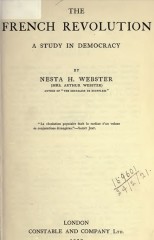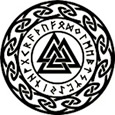
Author : Webster Nesta Helen (Mrs. Arthur Webster)
Title : The French Revolution A study in democracy
Year : 1919
Link download : Webster_Nesta_Helen_-_The_French_Revolution.zip
"La révolution populaire était la surface d'un volcan de conjurations étrangères." Saint Just. PREFACE. Astrologers tell us that the history of the world moves in cycles ; that from time to time the same forces arise producing eras that strangely resemble one another. Between these eras a close affinity exists, and so it is that we, in looking back to the past from the world crisis of to-day, reaUze that periods which in times of peace have soothed or thrilled us have now lost their meaning, that the principles which inspired them have no place in our philosophy. The Renaissance is dead ; the Reformation is dead ; even the great wars of bygone days seem dwarfed by the immensity of the recent conflict. But whilst the roar of battle dies down another sound is heard—the angry murmur that arose in 1789 and that, though momentarily hushed, has never lost its force. Once more we are in the cycle of revolution. The French Revolution is no dead event ; in turning over the contemporary records of those tremendous days we feel that we are touching live things ; from the yellowed pages voices call to us, voices that still vibrate with the passions that stirred them more than a century ago—here the desperate appeal for Uberty and justice, there the trumpet - call of " King and Country " ; now the story told with tears of death faced gloriously, now a maddened scream of rage against a fellow-man. When in all the history of the world until the present day has human nature shown itself so terrible and so subUme ? And is not the fascination that amazing epoch has ever since exercised over the minds of men owing to the fact that the problems it held are still unsolved, that the same movements which originated with it are still at work amongst us ? " What we learn to-day from the study of the Great Revolution," the anarchist Prince Kropotkin wrote in 1908, " is that it was the source and origin of all the present communist, anarchist, and socialist conceptions" Indeed Kropotkin goes so far as to declare that " up till now, modern socialism has added absolutely nothing to the ideas that were circulating among the French people between 1789 and 1794, and which it was tried to put into practice in the year 11. of the RepubUc {i.e. in the Reign of Terror). Modem socialism has only systematised those ideas and found arguments in their favour," etc. Now since the French Revolution still remains the one and only occasion in the history of the world when those theories were put into practice on a large scale, and carried out to their logical conclusion—for the experiment in Russia is as yet unfinished—it is surely worth while to know the true facts about that first upheaval. So far, in England, the truth is not known ; we have not even been told what really happened. "As to a real history of the French Revolution," Lord Cromer wrote to me a few months before his death, " no such thing exists in the English language, for Carlyle, besides being often very inaccurate and prejudiced, produced merely a philosophical rhapsody. It is well worth reading, but it is not history." Yet it is undoubtedly on Carlyle's rhapsody that our national conceptions of the Revolution are founded ; the great masterpiece of Dickens was built up on this mythological basis, whilst the old histories of Alison and Morse Stephens, and even the illuminating Essays of Croker, lack the power to rouse the popular imagination. Thus the legend created by Carlyle has never been dispelled. During the last few years the French Revolution has become less a subject for historical research than the theme of the popular joumaUst who sees in that lurid period material to be written up with profit. This being so, accuracy plays no part in his scheme. For the art of successful journalism is not to illuminate the public mind but to reflect it, to tell it in even stronger terms what it thinks already, and therefore to confirm rather than to dispel popular delusions. But if the Revolution is to be regarded as the supreme experiment in democracy, if its principles are to be held up for our admiration and its methods advocated as an example to our own people, is it not time that some effort were made to counteract that " conspiracy of history " that in France also, as M. Gustave Bord points out, has hitherto concealed the real facts concerning it ? Shall we not at last cease from rhapsody and consider the matter calmly and scientifically in its effects on the people ? This, after aU, is the main issue—how was the experiment a success from the people's point of view ? Strangely enough, though it was in their cause that the Revolution was ostensibly made, the people are precisely the portion of the nation that by RoyaHst and Revolutionary writers aUke have been most persistently overlooked—the RoyaUsts occupjdng themselves mainly with the trials of the monarchy and aristocracy, the Revolutionaries losing themselves in panegyrics on the popular leaders. Thus Michelet was a Dantoniste, Louis Blanc a Robespierriste ; Lamartine was a Girondiste ; Thiers and Mignet were Orleanistes, not only as historians but as poUticians, for their exoneration of the Due d'Orleans was only a part of their policy for placing his son Louis Philippe on the throne of France, and consequently to all these men the people were a matter only of secondary importance. So far no one has written the history of the movement from the point of view of the people themselves. In studjdng the Revolution as an experiment in democracy, we must clear our minds of all predilections for certain individuals. Just as the author of a treatise on the discovery of tuberculin or on the antidote to hydrophobia devotes no space to recording the sufferings of the unhappy guinea-pigs and rabbits sacrificed in the cause of science, or in dilating on the virtuous private life of Koch or Pasteur, but concerns himself solely with the exact process adopted and the symptoms exhibited by the subjects with a view to proving or disproving the ef&cacy of the serums employed, so, if we would examine the Revolution as a scientific experiment. King, noblesse, and revolutionary leaders alike must be considered only in their relation to the cause of democracy ; we must concern ourselves with the people only, with the ills from which they suffered, with the means employed for their reUef, with the part they themselves played in the great movement, and finaUy the results that were achieved. By this means alone we shall do justice to that brave and brilliant people by whose side we have fought to-day ; we shall come to understand that they were not the bUnd unreasoning herd portrayed by Taine, the enraged " hyenas " of Horace Walpole, nor yet, as revolutionary writers would have us beUeve, a nation of slaves brought by long years of oppression to a pitch of exasperation that found a vent in the crimes and horrors of the Revolution. It is on this last theory that popular opinion in England on the Revolution is founded, and that might, I think, be epitomized thus : " The French Revolution was in itself a purely beneficial movement, inspired by the desire for Uberty and justice : unhappily it went too far and produced excesses which, though deplorable, were nevertheless the unavoidable accompaniment to the regeneration of the country." Now this statement is as illogical as it is unjust ; how could a movement that was purely beneficial " go too far " ? How could the desire of the people for Uberty and justice be carried to excess and produce cruelty and bloodshed such as the civilized world had never seen before ? If this were true, then the only opinion at which a thinking human being could arrive would be that the French Revolution was the reductio ad dbsurdum of the proposition of democracy, a proposition that, once worked out to its tragic and grotesque conclusion, should have proved for all time that to give power into the hands of the people is to create a tyranny more terrible than any despotism can produce. But it was not so ; it was not the desire of the people for liberty and justice that produced these horrors ; it was not the movement for reform that " went too far " ; the crimes and excesses of the Revolution sprang from totally distinct and extraneous causes that must be understood if justice is to be done to the people of France. It is by the revolutionary writers that the people have been most maUgned, for since, as I have pointed out, these writers were not the advocates of the people but of certain revolutionary leaders, their method is to absolve their heroes from all blame and heap the whole responsibihty upon the people. For this purpose a legend has been woven around all the great outbreaks of the Revolution and the r61e of the people persistently misrepresented. Now if we study carefully the course of the revolutionary movement we shall find that the role of the people is in the main passive ; only on these great days of tumult do they play an active part. Between these outbreaks the fire of revolution smoulders, at moments almost flickers out, then suddenly for no apparent reason bursts again into flame, and it is only by long and patient search amongst contemporary documents that we can begin to understand the causes of these conflagrations. " The popular Revolution, " said St. Just, " was the surface of a volcano of extraneous conspiracies/' and consequently the actions of the people seen from the surface only can never be understood. Thus the story of the Revolution, as it is usually told us, with its pointless crimes, its unreasoning violence, and its hideous waste of life, is simply unintelligible—" a tale told by an idiot, full of sound and fury and signifying nothing." If, then, we would discover the truth about these great revolutionary outbreaks, we must dig down far below the surface, we must trace the connection between the mine and the explosion, between the actions of the people and the causes that provoked them.^ For, as Mr. Croker truly observed, " It is doubtless a very remarkable—^though hitherto very little remarked— feature of the whole Revolution, that not one, not a single one, of the tumults which now had its successive stages, from the Affaire Reveillon to the September massacres, had any real connection with the pretext under which it was executed." These great moments of crisis, five in number, are Uke the five acts of a tremendous drama ; through them all we see the same methods at work, the same actors under different disguises, the same tangled threads of intrigue leading up to the tremendous cataclysm of the Terror. The Siege of the Bastille—the March on Versailles—the two Invasions of the Tuileries—the Massacres of September—and finally the Reign of Terror—these form the history of the French people throughout the Revolution. The object of this book is, therefore, to relate as accurately as conflicting evidence permits the true facts about each great crisis, to explain the motives that inspired the crowds, the means employed to rouse their passions, and thereby to throw a truer Ught on the rdle of the people, and ultimately on the Revolution as the great experiment in democracy. ...

Tourney Phillip - What I saw that day
Authors : Tourney Phillip F. - Glenn Mark Title : What I saw that day Year : 2011 Link download :...














